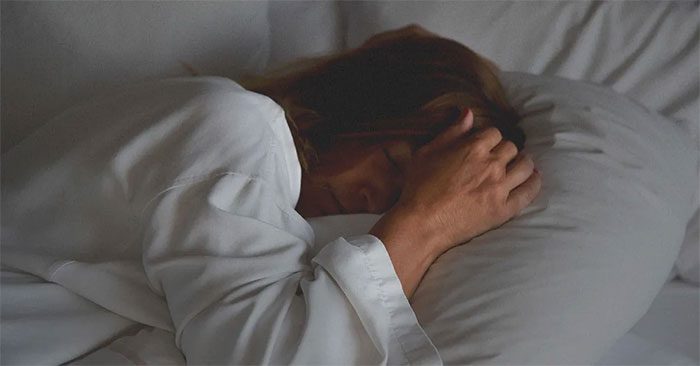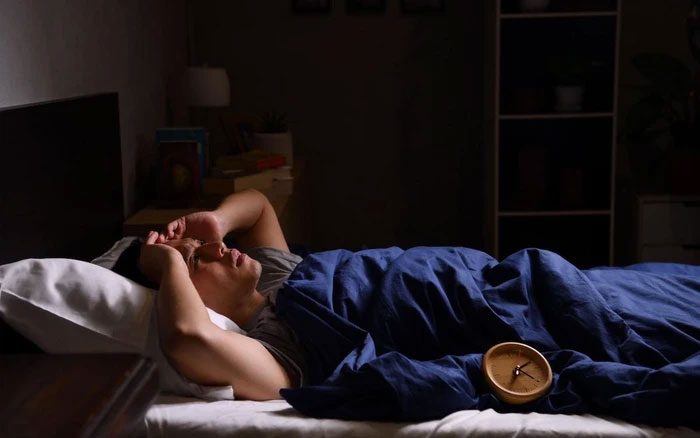Nighttime headaches can disrupt sleep and affect daily activities the next day. What is nighttime headache? Can nighttime headaches be treated?
Below is some essential information you need to know about nighttime headaches, including causes, coping strategies, effective prevention methods, and symptoms indicating that you should see a doctor soon.
What is a Nighttime Headache?
1. What are the causes of nighttime headaches?
Nighttime headaches can be caused by various factors, including stress, lack of sleep, and side effects from certain medications.
1.1. Tension headaches
Most people experience tension headaches at some point. The intensity of the pain can range from mild to severe.
Experts are unsure about the exact cause of tension headaches, but they are often triggered by stress, fatigue, and muscle tension. These can occur after a long day.
For some individuals, teeth grinding can also trigger tension headaches. If the pain is severe enough, it may wake you up.

Excessive stress can cause nighttime headaches. (Image: Internet).
Other signs of tension headaches include:
- A dull or tight sensation in the head
- Pain on both sides of the head or forehead
- Sensitivity in the neck, shoulders, and scalp
- A feeling of pressure around the head.
1.2. Cluster headaches
Cluster headaches are severe, excruciating headaches that occur in groups or cycles. They can last for weeks or months, with alternating periods of remission. Although cluster headaches often occur during the day, they can also appear at night (a few hours before bedtime).
The exact cause of cluster headaches is not fully understood, but certain triggers such as alcohol consumption and changes in sleep patterns may contribute to their occurrence. Other symptoms of cluster headaches include:
- Severe pain, often around one eye
- Headaches recurring at the same time each day
- Pain that starts on one side but spreads
- Redness, swelling, drooping, or tearing in the affected eye
- Blocked or runny nose on one side
- Skin pallor or flushing
- Restlessness and inability to sit still during an attack.
1.3. Migraines
Migraines are intense headaches that can be accompanied by other symptoms such as nausea, sensitivity to light and sound, and visual disturbances. While migraines can occur at any time, they may worsen at night due to changes in sleep cycles.
If you are unsure whether your symptoms indicate a migraine or a regular headache, learn more about the differences between these two types.
Migraines are often triggered by specific factors, including:
- Hormonal changes related to the menstrual cycle, pregnancy, or menopause
- Changes in weather and atmospheric pressure
- Certain foods and food additives
- Changes in sleep cycles
- Stress pressure
- Sensory stimuli such as smells, sounds, or light

Migraines can worsen at night. (Image: Internet).
If you are unsure what triggers your migraines, try keeping a record of each time you experience an attack. Note the time of day, the activities you are engaged in, weather conditions, and any other information that may help you pinpoint the cause. Pay attention to these triggers to take appropriate countermeasures.
1.4. Hypnic headache syndrome
Hypnic headache syndrome occurs solely at night and tends to happen at the same time. This type of headache is quite rare and typically begins after age 50, with pain levels ranging from mild to severe on both sides of the head. Other symptoms of hypnic headache syndrome may include:
- Headaches waking you up around 10 times each month
- Headaches lasting from 15 minutes to 4 hours after waking
- Nausea and vomiting
Similar to cluster headaches, the triggers for hypnic headaches remain unidentified, but they have been linked to the hypothalamus, a brain region associated with pain perception and sleep-wake cycles.
1.5. Other causes of nighttime headaches
Some health conditions can contribute to nighttime headaches, such as sleep apnea, teeth grinding, high blood pressure, spinal disorders like cervical spondylosis, and carpal tunnel syndrome. Treating these conditions may help alleviate nighttime headaches.
1.6. Are nighttime headaches caused by a brain tumor?
In rare cases, nighttime headaches may signal the presence of a brain tumor. A growing brain tumor increases intracranial pressure and leads to headaches that worsen over time.
In addition to headaches, brain tumors may cause seizures, nausea and vomiting, vision loss, and changes in balance.
2. How to determine what type of headache you have?
While some types of headaches have characteristic features for identification and diagnosis, most headaches require consultation with a doctor. The doctor may ask you a series of questions to facilitate diagnosis, such as:
- Intensity of pain: Does your headache wake you up at night? Does it prevent you from falling back asleep? How much sleep do you lose due to your headache? Is it the worst pain you have ever experienced?
- Type of pain you feel: Is the pain dull and throbbing? Is it sharp and stabbing like a knife? Do you feel like your eyes are burning? Does the pain make your heart race or remain steady?
- Location of pain: Does the pain affect one side of your head or both? Is it only in your forehead or does it extend to the back and sides? Does the pain radiate down your neck or shoulders? Is the pain focused around one eye?
- Accompanying symptoms: Do you feel nauseous or vomit? Do you experience dizziness or sensitivity to light and sound?
- Any warning signs: Before your headache begins, do you experience any symptoms like visual disturbances or mood changes?

How to determine what type of headache you have? (Image: Internet).
- Potential triggers: Have you noticed that your headaches occur on nights when you eat specific foods? Do they occur during unusual weather conditions? Do your symptoms appear in a cycle corresponding to your menstrual cycle?
- Timing of headaches: Do they only occur while you are sleeping? Do they occur at the same time each night?
- Duration of headaches: How long have these headaches been occurring? When did they first start? Have you had headaches at any other times?
- What helps or worsens: Is there anything that makes your headache feel better or worse?
For about two weeks before seeing a doctor, keep a record of every headache you experience using the questions listed above.
3. Coping with nighttime headaches
Over-the-counter treatments
Depending on the type of headache you are experiencing, treatment for nighttime headaches may vary. If you are unsure about the type of headache, start with an over-the-counter pain reliever (OTC) such as ibuprofen or acetaminophen.
If these medications do not alleviate your nighttime headache, you may try a pain reliever that contains aspirin and caffeine.
Caffeine is also one of the common treatments for headaches that occur during sleep. If you experience symptoms of sleep-related headaches, try taking a caffeine supplement or drinking a cup of coffee before bedtime. For those who actually suffer from sleep headaches, this typically does not cause issues with sleep onset.
Taking melatonin supplements in the evening may also help reduce sleep headaches and episodic headaches. However, any supplementation with melatonin or other dietary supplements should be done under a doctor’s guidance.
If you suspect that your headaches may be stress-related, consider incorporating some stress-reduction techniques into your daily routine. Try to spend at least 5 to 10 minutes when you get home from work doing some breathing exercises, yoga, or meditation.
Most headache treatments involve making significant lifestyle changes along with practical strategies for managing your condition. This may include: exercising more regularly (even a walk can help reduce stress and muscle tension related to headaches); ensuring a healthy diet and not skipping meals; getting enough sleep and maintaining a consistent wake-sleep schedule (sleep hygiene); avoiding crash diets and nighttime headache triggers.

Depending on the type of headache you experience, the treatment approaches will differ. (Image: Internet).
Prescription Treatments
If over-the-counter pain relievers and relaxation methods do not alleviate your nighttime headaches, your doctor may prescribe additional treatments.
There are several oral medications you may use, including:
- Triptans: These medications constrict blood vessels and block pain pathways to treat migraines. They may also help with chronic headaches and cluster headaches.
- Prescription Pain Relievers: If you have severe pain, your doctor may suggest a stronger pain reliever that contains opioids.
- Beta-blockers and Calcium Channel Blockers: These medications are often used to treat high blood pressure but may also help prevent migraines and cluster headaches.
- Antidepressants, anticonvulsants, lithium, corticosteroids, indomethacin may also be prescribed depending on the headache condition.
In addition to oral medications, injections can also provide relief from nighttime headaches, depending on the condition. These may include: Botox, nerve block injections, octreotide, triptans, etc. However, before using any medication, you should consult with your doctor to ensure it is a suitable and safe treatment for you.
For nighttime headaches caused by cluster headaches, your doctor may also recommend using nasal spray pain relievers or oxygen therapy.
Tips for Better Sleep
By effectively practicing sleep hygiene, you can prevent or reduce the severity of nighttime headaches. Specifically:
Wake up and go to bed at the same time each day
- Get 7-8 hours of sleep each night
- Avoid caffeine-containing beverages before bed unless caffeine is part of a specific headache treatment
- Avoid alcohol and smoking before bedtime
- Relax before bed, and do not use electronic devices before sleeping…
4. When to See a Doctor for Nighttime Headaches?
Nighttime headaches are usually not a serious issue. However, if you experience severe headaches that differ from your usual pattern, or if the pain intensifies even with pain relief methods accompanied by any of the following signs, you should see a doctor promptly:
- Loss of consciousness after a head injury
- Headaches that appear very quickly and suddenly
- Unusually severe headache pain
- Headaches worsening over a period of 14 hours or more
- The worst headache pain you have ever experienced
- Continuous vomiting
- Numbness or weakness on one side of the body
- Vision problems such as double vision or blurriness
- Pain or redness in one eye
- Issues coordinating limb movements
- Loss of balance, dizziness
- Fever accompanied by neck stiffness
- Difficulty chewing and/or swallowing
- Neurological symptoms, such as memory problems or speech issues, altered consciousness, fainting
- Changes in personality or mood.
In summary, nighttime headaches can stem from various disorders and health issues. Depending on the type of headache, the symptoms of nighttime headaches will vary. Tension headaches cause a dull, aching pain and pressure on both sides of the head. Migraines are more severe and typically localized to one side, often accompanied by symptoms such as nausea, vomiting, sensitivity to light and sound, and visual disturbances. Cluster headaches occur in groups, featuring episodes of intense pain over a short period. Finally, sleep-related headaches are those that only occur while you are sleeping.
Treatments for nighttime headaches focus on symptom management, preventing pain, and implementing positive lifestyle changes. Both over-the-counter and prescription medications are available to relieve pain when headaches occur. Additionally, ensuring proper and healthy sleep hygiene, not skipping meals, and managing stress can also be beneficial.


















































